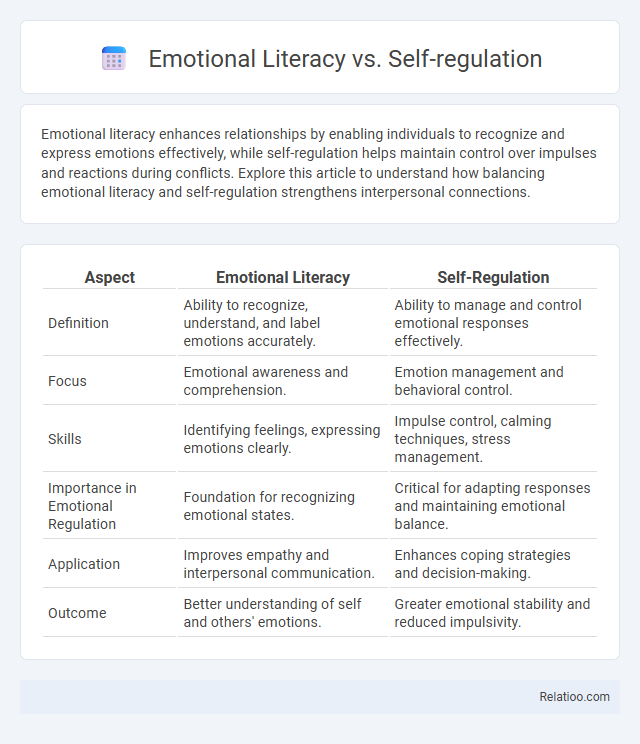Emotional literacy enhances relationships by enabling individuals to recognize and express emotions effectively, while self-regulation helps maintain control over impulses and reactions during conflicts. Explore this article to understand how balancing emotional literacy and self-regulation strengthens interpersonal connections.
Table of Comparison
| Aspect | Emotional Literacy | Self-Regulation |
|---|---|---|
| Definition | Ability to recognize, understand, and label emotions accurately. | Ability to manage and control emotional responses effectively. |
| Focus | Emotional awareness and comprehension. | Emotion management and behavioral control. |
| Skills | Identifying feelings, expressing emotions clearly. | Impulse control, calming techniques, stress management. |
| Importance in Emotional Regulation | Foundation for recognizing emotional states. | Critical for adapting responses and maintaining emotional balance. |
| Application | Improves empathy and interpersonal communication. | Enhances coping strategies and decision-making. |
| Outcome | Better understanding of self and others' emotions. | Greater emotional stability and reduced impulsivity. |
Understanding Emotional Literacy
Understanding emotional literacy involves recognizing, interpreting, and expressing your emotions accurately to improve interpersonal communication and personal well-being. It forms the foundation for effective self-regulation, which is the ability to manage and control emotional responses in various situations. Developing emotional literacy enhances emotional intelligence by deepening your awareness of emotions and fostering empathy with others.
Defining Self-Regulation
Self-regulation is the ability to manage and control one's emotions, thoughts, and behaviors in different situations to achieve long-term goals. Emotional literacy involves recognizing, understanding, and expressing emotions effectively, while self-regulation builds on this by enabling individuals to modulate their emotional responses and maintain impulse control. Developing self-regulation is essential for emotional intelligence and mental well-being, as it helps navigate stress, maintain focus, and foster positive social interactions.
Key Differences Between Emotional Literacy and Self-Regulation
Emotional literacy involves recognizing, understanding, and expressing emotions accurately, while self-regulation focuses on managing and controlling emotional responses effectively. Your ability to identify emotions through emotional literacy lays the foundation for self-regulation, which requires strategies to maintain emotional balance and respond adaptively. Key differences lie in emotional literacy's emphasis on awareness and expression versus self-regulation's role in emotional control and behavioral adjustment.
The Importance of Emotional Literacy in Daily Life
Emotional literacy is essential in daily life as it enables you to accurately recognize, express, and understand your own emotions and those of others, fostering healthier relationships and effective communication. Unlike self-regulation, which focuses on managing emotional responses, emotional literacy provides the foundational awareness needed to identify emotions before controlling them. Mastery of emotional literacy enhances empathy, reduces conflicts, and supports mental health by promoting emotional clarity and resilience.
The Role of Self-Regulation in Personal Development
Self-regulation plays a crucial role in personal development by enabling you to manage impulses, emotions, and behaviors effectively. Unlike emotional literacy, which involves recognizing and understanding emotions, self-regulation emphasizes control and adaptation in response to emotional experiences. Mastering self-regulation enhances emotional intelligence and supports goal achievement, stress management, and overall psychological well-being.
How Emotional Literacy Supports Self-Regulation
Emotional literacy enhances your ability to recognize and understand emotions, which is essential for effective self-regulation. By accurately identifying emotional states, you can better manage responses and reduce impulsive behaviors. Developing emotional literacy provides the foundation for regulating emotions, improving decision-making and interpersonal interactions.
Common Challenges in Building Emotional Literacy
Common challenges in building emotional literacy include difficulty recognizing and naming emotions accurately, which can hinder your ability to express feelings clearly and manage relationships effectively. Emotional literacy requires consistent practice in identifying subtle emotional cues, whereas self-regulation focuses on controlling emotional responses once emotions are understood. Overcoming emotional avoidance and limited emotional vocabulary often complicates the development of both emotional literacy and self-regulation skills.
Techniques to Enhance Self-Regulation Skills
Techniques to enhance self-regulation skills include mindfulness practices, deep breathing exercises, and cognitive reframing, which help individuals manage impulses and emotions effectively. Emotional literacy supports self-regulation by improving awareness and understanding of one's feelings, enabling better emotional control and response. Combining emotional literacy with self-regulation techniques fosters resilience and promotes healthier interpersonal interactions.
Impact of Emotional Literacy and Self-Regulation on Relationships
Emotional literacy enhances your ability to identify, understand, and express emotions effectively, forming the foundation for healthy communication and empathy in relationships. Self-regulation builds on this foundation by enabling you to manage emotional responses, reducing conflicts and fostering trust. Together, these skills improve relationship satisfaction and resilience by promoting emotional awareness and controlled reactions.
Strategies for Integrating Both Skills in Education and Work
Emotional literacy and self-regulation are essential skills for managing emotions and behavior effectively in educational and workplace settings. Strategies for integrating both include incorporating mindfulness practices, emotional vocabulary development, and role-playing scenarios that promote empathy and impulse control. By fostering these competencies, you can enhance communication, reduce conflicts, and improve overall emotional intelligence in your environment.

Infographic: Emotional literacy vs Self-regulation
 relatioo.com
relatioo.com